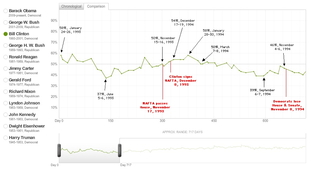Would you like to come on a trip to a magical imaginary world? Well then, join Rahm Emanuel and his reporter sidekick Jonathan Weisman aboard this Wall Street Journal article:
White House Chief of Staff Rahm Emanuel has been telling Democrats a win on the health issue will reverse the slide in public opinion, just as passage of another controversial proposal, the North American Free Trade Agreement, lifted President Bill Clinton in the polls...
In an interview Friday, Mr. Emanuel expressed little concern for the president's standing with the Democratic base. Mr. Emanuel said the liberal wing of the party is already coming back to the fold.
This would be a bizarre thing for Emanuel to be telling other Democrats under any circumstances: NAFTA passed at the end of 1993 in Clinton's first year, and then in 1994 the Democrats promptly lost control of both the House of Representatives and the Senate--the House for the first time in forty years. You wouldn't think hearing Emanuel compare today to that would really get Democrats to break out the champagne.
But what about Emanuel's specific claim: that passing NAFTA "lifted Bill Clinton in the polls"?
To start with, that's nearly impossible on the face of it. NAFTA was unpopular. It was debated throughout 1993, and a September poll that year got these results:
Do you favor or oppose the proposed free-trade agreement between the United States and Mexico?
Favor 35% (7% strongly, 28% moderately)
Oppose 41% (21% strongly, 20% moderately)
No Opinion 24%
Moreover, few people even knew what Clinton's position on NAFTA was: the same poll found 31% thought he supported it, 1% thought he opposed it, and 68% weren't sure.
But what were Clinton's actual approval ratings? Here's a graph (click to enlarge), created with a useful USA Today tool:
So let's take a look at that section of Jonathan Weisman's Wall Street Journal story again, but with additions to bring it into line with reality:
White House Chief of Staff Rahm Emanuel has been telling Democrats a win on the health issue will reverse the slide in public opinion, just as passage of another controversial proposal, the North American Free Trade Agreement, lifted President Bill Clinton in the polls.
In fact, by the time NAFTA passed Clinton's approval ratings were already on a five-month upswing, improving from 38% in June, 1993 to 50% just before the House voted on the treaty that November. In the unlikely event Clinton did receive a bounce from passing the unpopular NAFTA, it was both small and short-lived: his approval rating went on to hit 58% once, at the end of January, 1994; it then slid back to 50% by the beginning of March, and was once more in the doldrums at 39% in September, nine months after Clinton signed NAFTA into law. On November 8, 1994, the Democrats lost the House and Senate, and would not regain them both for twelve years.
Of course, the real people to blame here aren't Emanuel or Weisman. Emanuel is a professional hack; his job is to generate exactly this kind of truthiness (although this is a particularly shameless example). Weisman is another kind of professional hack; he works for Rupert Murdoch, who orders his employees to serve up a steaming crock of shit every morning to their readers.
The real villains are America's educated upper middle class. In theory doctors, scientists, lawyers, professors, etc. care about reality. And if we got our act together we have the power to demand it; we could even create new institutions that could employ Jonathan Weisman and encourage him to question Rahm's latest imaginary history. But in practice it turns out that's just too much trouble. So we get $3 trillion wars and $8 trillion housing bubbles based on transparent lies.
PREVIOUSLY: Other great past achievements in stenography include those by Michael Gordon and Jeffrey Goldberg.
